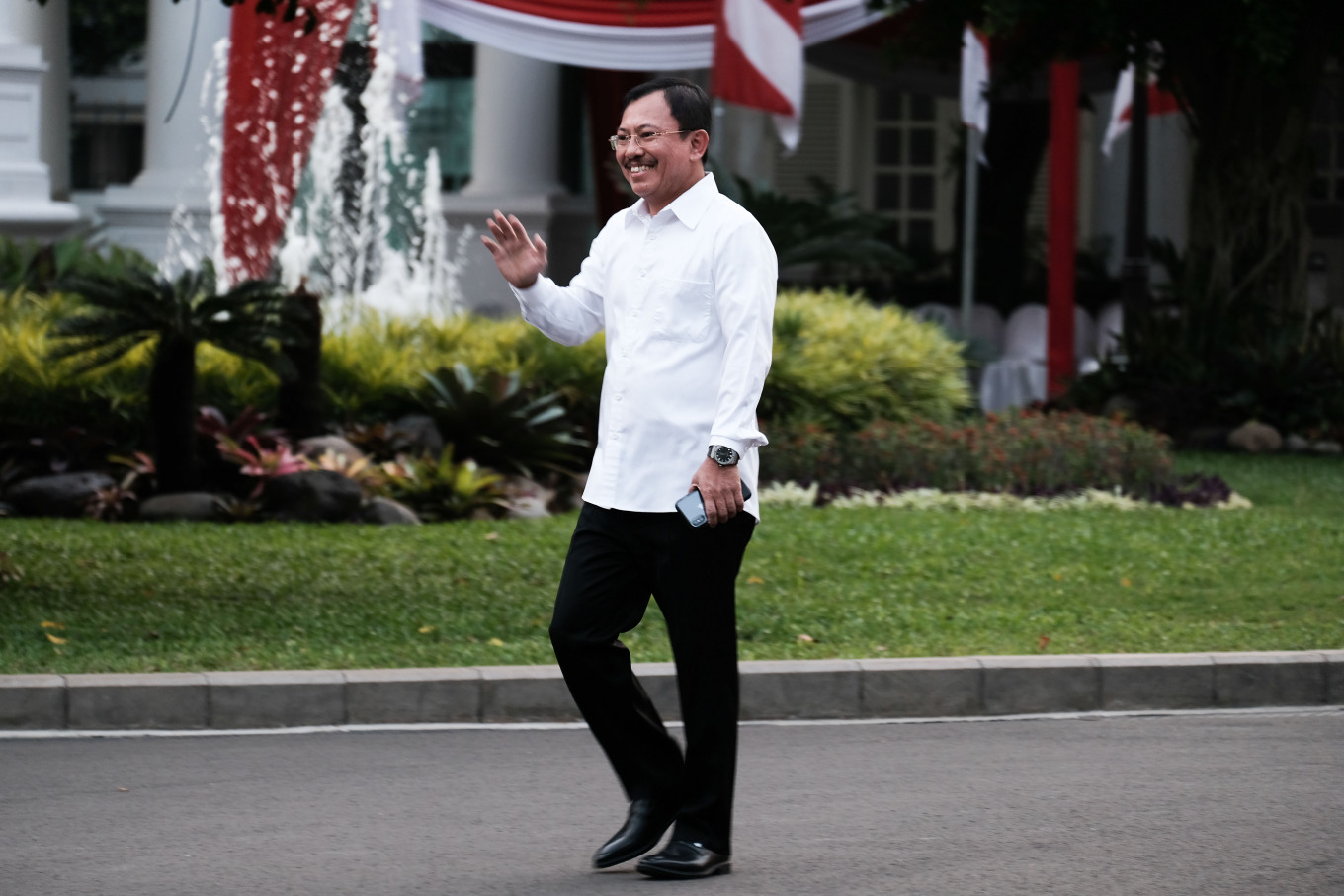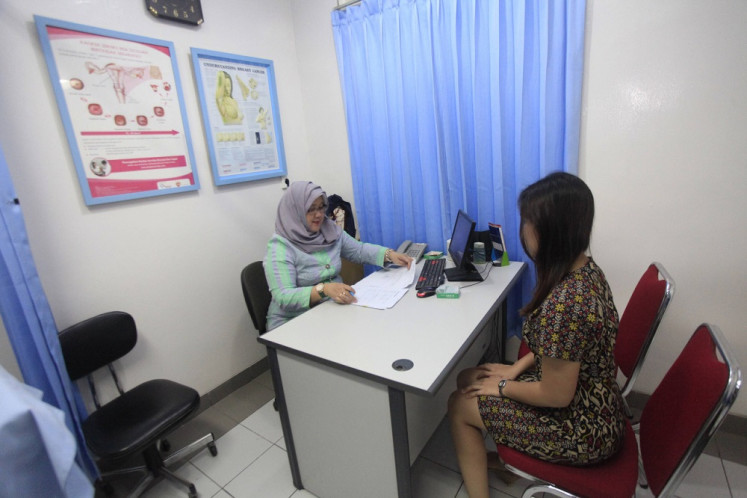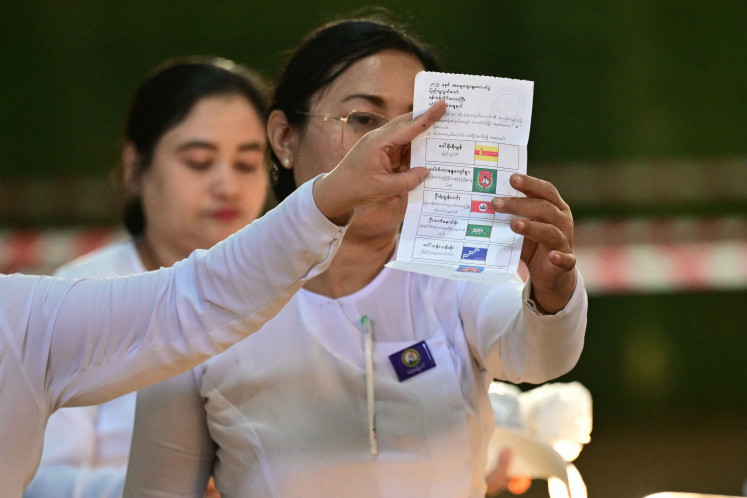Popular Reads
Top Results
Can't find what you're looking for?
View all search resultsPopular Reads
Top Results
Can't find what you're looking for?
View all search resultsDespite health minister controversy, health priorities can’t wait
Indeed, what is needed most is closer cooperation with and dedication of all relevant parties to tackle the country’s complex health problems. But the safety of medical treatments is also vital given citizens’ right to safe and effective healthcare services. Terawan’s appointment must not be an excuse to tolerate further breaches of medical ethics.
Change text size
Gift Premium Articles
to Anyone
 Terawan Agus Putranto has been appointed as health minister in President Joko “Jokowi” Widodo’s Indonesia Onward Cabinet 2019-2024. The former director of the Gatot Subroto Army Hospital (RSPAD) is now fully in command of the country’s healthcare team even though he does not currently have a permit to practice as a physician. (JP/Donny Fernando)
Terawan Agus Putranto has been appointed as health minister in President Joko “Jokowi” Widodo’s Indonesia Onward Cabinet 2019-2024. The former director of the Gatot Subroto Army Hospital (RSPAD) is now fully in command of the country’s healthcare team even though he does not currently have a permit to practice as a physician. (JP/Donny Fernando)
T
erawan Agus Putranto has been appointed as health minister in President Joko “Jokowi” Widodo’s Indonesia Onward Cabinet 2019 - 2024. The former director of the Gatot Subroto Army Hospital (RSPAD) is now fully in command of the country’s healthcare team despite the controversy around him.
The ethics council of the Indonesian Medical Association (IDI) had earlier written to Jokowi, saying that as Terawan, reportedly one of several candidates for health minister, was still being penalized for breaching medical ethics, he should not be appointed minister.
Terawan became famous for his “brain-cleaning” treatment among stroke patients and their families. Many patients claimed they were healed though the “intra-arterial cerebral flushing”, which has not been scientifically proven to be safe for stroke patients, according to the IDI.
For medical professionals, any newly discovered medical therapy must have empirical evidence to be safe and/or effective for use, to prevent patients being exposed to risk as much as possible. Last year Moh. Hasan Machfoed, then chair of the Indonesian Neurological Association (Perdossi), said Terawan’s stroke-treatment method, which includes digital subtraction angiography, was a diagnostic tool, an imaging X-ray technique to visualize blood vessels; but instead, it had been used by the Army doctor as a tool for therapy and even illness prevention. Terawan remained popular as no one reported, in public at least, of deteriorating health as a result of his treatment.
In announcing his decision on the health minister, Jokowi expressed his firmness as if he was unaware that ensuring the safety and efficacy of a medical treatment is the standard practice of medical professionals in treating illnesses and helping patients maintain good health.
Jokowi said that with Terawan’s capacity and experience in managing budgets and human resources, including during his service as the RSPAD director, Terawan had met all the criteria required to be a health minister. Terawan’s position as vice chairman of the 2019 International Committee of Military Medicine may be among the points that impressed the President. His bold, controversial therapy may have displayed the “out-of-the-box” trait needed for solutions and strategies that Jokowi seeks for various positions and problems.
Jokowi further considered Terawan capable of handling endemic diseases. Indonesia is particularly vulnerable to natural disasters, which can lead to outbreaks of diseases that are already endemic in the area, Jokowi said. Terawan was also touted as a medical professional who had always leaned toward prevention-oriented health approaches.
Deputy chairman of the IDI’s ethics council Pukovisa Prawiroharjo said the association fully respected Jokowi’s decision and would fully cooperate with the minister. However his breach of medical ethics is still being followed up “in a confidential and internal mechanism”, as quoted by tempo.co.id.
It makes sense that the IDI chooses to avoid conflict at all costs given many of the nation’s health problems – including the prolonged deficit at state insurer the Health Care and Social Security Agency (BPJS Kesehatan) caused by a rise in noncommunicable diseases, and stubbornly high stunting rates in children.
Meanwhile the number of patients with catastrophic illnesses has continued to increase every year, adding to the insurer’s financial burden. In 2018, the BPJS had to pay Rp 24.42 trillion (US$1.74 billion) in service costs for diseases including heart disease and kidney failure. Further, while the government claims that it has managed to bring the stunting prevalence down
to 30.8 percent from 32.3 percent following focused efforts, the figure remains high because Indonesia aims to reduce its stunting rate to lower than 20 percent by 2030.
During a handover ceremony at the Health Ministry in Jakarta on Oct. 24, former minister Nila A. Moeloek reminded her successor that the unbalanced distribution of the health workforce between urban and rural areas remains a major challenge that may lower the quality of healthcare services in the country. She hoped that under Terawan’s leadership, the ministry could
provide better geographically distributed healthcare facilities, strengthen community health centers (Puskesmas) and build more hospitals for third class healthcare services to improve healthcare access in remote villages and disadvantaged regions.
Nila also hoped the new minister could continue the Healthy Indonesia with Family-based Approach Program (PISKP). In the program, every Puskesmas health worker is assigned to visit a family to check their health condition as part of early detection efforts. As health awareness is still low, the program is vital in spreading health information and awareness among the grass roots, Nila argued.
Indeed, what is needed most is closer cooperation with and dedication of all relevant parties to tackle the country’s complex health problems. But the safety of medical treatments is also vital given citizens’ right to safe and effective healthcare services. Terawan’s appointment must not be an excuse to tolerate further breaches of medical ethics.
***
Correction: In an article published on Oct. 29, entitled "Despite health minister controversy, health priorities can't wait", it was mistakenly reported that Health Minister Terawan Agus Putranto does not have a permit to practice as a physician. However, his permit is still valid. We regret the editing error and all inconveniences it may have caused.










